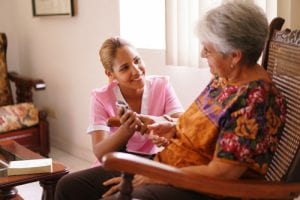Work experience is a big part of any medical application. The work experience you do will almost definitely be part of your interview and selection process, and as such you should put in the effort to make sure yours is as useful as possible to you.

In terms of overall work experience, mine was varied. I’d worked part time in an opticians since I was sixteen, I volunteered at a local hospice, I worked with disabled kids, and I helped run fundraisers for a local HIV charity. Almost all of these were coincidental to my decision to study medicine and they’re all fantastic things to do if you get the opportunity, both for personal growth and medical experience. I was also fortunate enough to spend a week in a hospital under the wing of a consultant oncoplastic breast surgeon after she came to give a talk at my college – I managed to sneak her PA’s email at the end. Definitely don’t be afraid to approach people you know or meet and ask if they can help you, because the worst thing that’ll happen is they’ll say no!
Volunteering at the hospice was the most valuable piece of experience I had. Volunteering roles such as these are usually easy to find in your local hospice or care home, as they’re always looking for more hands to help out. Often all you’ll need to do is drop them an email, attend an interview and get DBS checked.
Long term commitment to a role both looks good and is good for you – whilst observing surgeries and meeting patients with rare conditions can be exciting, the crux of being a good doctor is being good with patients. Proving that you can talk to patients day in and day out is vital, and if you don’t enjoy doing so in a hospice or other care facility, it’s worth considering whether you’ll really enjoy doing so in a hospital or primary care setting.
Hospice and care home work is often clinical enough that if you want to pick up on some medical vocabulary you’ll be able to, without the academic understanding often required in a hospital. The atmosphere is generally relaxed, patients are happy to see you and nurses willing to chat. You’ll also often find that a lot of the other volunteers are also aspiring healthcare students, so you can help each other out when it comes to useful resources you each know of.
When it comes to your personal statement, it can be useful to have notes of the time you spent on work experience or volunteering. If you can, keep a diary, and consider how different events impacted you and what you learnt from them. This will also become very useful when you’re preparing for interviews! Showcase the skills your work experience gave you: commitment, empathy, confidence, teamwork, understanding of the realities of healthcare – and talk about why these skills are important for a doctor to have. Medical schools aren’t incredibly interested in your clinical knowledge, as this is what they’re planning to teach you, they’d rather see the qualities and values you have that will make you a good doctor and a good medical student.
In general, try to see what qualities or experiences you gained from work experience and really put this across in your personal statement. Rather than thinking of it as necessary to becoming a medical student, try and enjoy the experience and what it gives you.
Words: Riley Botelle
